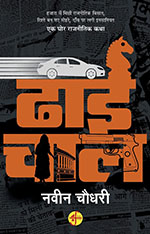Dhaai Chal is the second novel by the writer of Janta Store, and resumes the tale told before with an action-filled look at the political manoeuvres that look deep inside a world riddled with allegations of rape, rape before marriage, kidnap, elopement, intent to push a minor into flesh trade, micro-managed bid at self-immolation, and murder, only to be further complicated by caste, religion, power play, and media, to indulge in corruption, betrayal, and bloody revenge. Does a novel that lays claim to be a rank political narrative cease to be literary? Dhaai Chal by Naveen Chaudhury is indeed topical for it attempts to figure out human condition in the western Indian State of Rajasthan and in so doing it prefers to relate the narrative about a fictional place dominated by Muslims.
A novel that begins at a party on Christmas Eve thrown by a media house in the capital of India ends in the town of Hazara in the month of November. Unlike Takht Hazara, where Ranjha was born to go down in memory as a passionate lover, this Hazara has Azhar who eyes Seema, a minor, daughter of Ramphool, who in turn is a close associate of Amit, Raghvendra’s younger brother.

